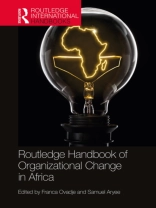Although change management and therefore effective adaptation to environmental complexity is considered a uniquely human cultural activity, the extensive change management literature is largely based on the experiences of organizations in the advanced economies of the West. As the economies of African countries become increasingly open, African organizations will need to be agile in order to adapt and grow in a dynamic, global environment. Currently, there is a dearth of contextualized knowledge on change management within Africa, but this handbook aims to address this by bringing together a wide range of experts to explore organizational change and change management from an African context.
The handbook adopts a multidisciplinary (historical, philosophical, processual, and strategic) perspective as well as empirical accounts of change management. It addresses such issues as: What are the external and internal pressures for change? What is the content and process of change management? What are the essentials of effective change management? How can change management be theorized from an African perspective? What sort of leadership can best align with change management demands in an African context? How do organizations build internal change management capability? It is hoped that answers to these questions contained in the handbook will provide a contextualized understanding of change management which African organizations and scholars can leverage to respond to the threats and opportunities inherent in their increasingly dynamic environment.
The handbook should constitute an essential reference for academics, researchers, and advanced students of change management, development studies, and African studies, as well as practitioners.












